Alleged corruption in Cambodia’s monkey farms taints global wildlife trade
Largest monkey farm in Cambodia meets demands for monkey specimens and live animals for years before being charged for wildlife trafficking
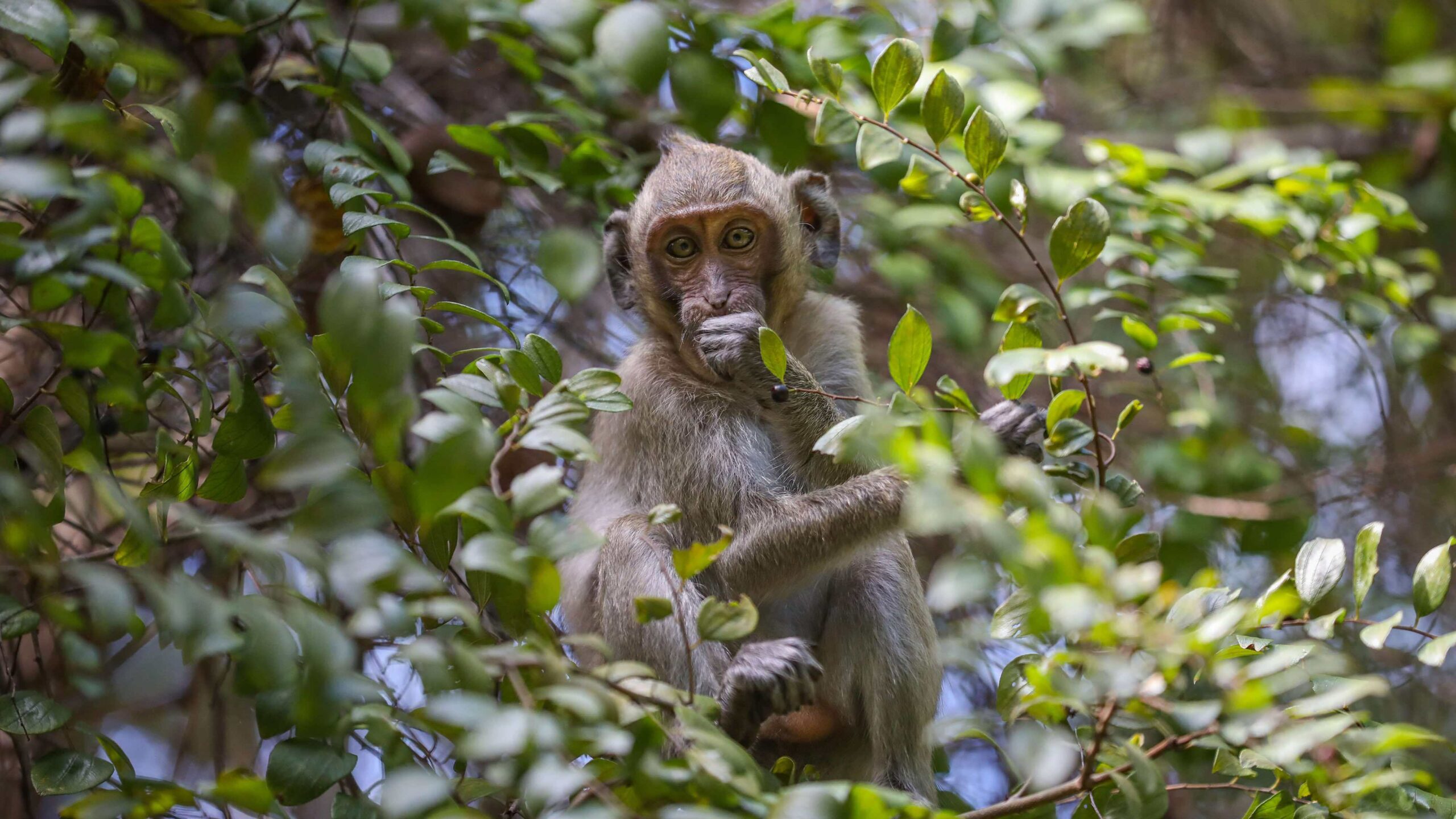
Looming walls topped with barbed wire dissected rice fields around Vanny Bio Research in Cambodia, concealing the wildlife breeding operations within.
A welcome sign stated that the farm would “not accept any interview from any media”.
The owners and managers of this facility, as well as two Cambodian government officials, were indicted by U.S. prosecutors for wildlife trafficking in November.
U.S. federal court documents allege this “international wildlife smuggling ring” used the legal trade of captive-bred monkeys to launder thousands of wild-caught monkeys into U.S. laboratories over at least four years. The billion-dollar legal industry draws heavily on the long-tailed macaque species to provide monkeys for medical experiments.
“America is the centre of the global trade in primates for research,” said Sarah Kite, co-founder of the animal rights group Action for Primates. “Anything that happens within the American import and export trade will have repercussions on the supply chain throughout the world.”
Cambodia’s dominance of this trade, which spiked during the Covid-19 pandemic, leaves researchers boggled and pointing at the country’s murky monkey business. Besides the ecological impacts to the dwindling number of wild monkeys, veterinary scientists say mixing poached animals with the farmed population could pose a global public health risk by potentially exporting diseases to foreign labs.
The U.S. imported the highest number of live macaques from Cambodia during each of the years corruption is alleged, totaling nearly 70,000 monkeys, according to trade data. As of now, it’s unclear how many may have been taken from the wild, but prosecutors have hinted at thousands.
For an unknowable number of these potentially trafficked animals, or at least bits and pieces of them, the U.S. was just a layover. That’s because labs there routinely dissected Cambodian macaques to re-export hundreds of shipments of dismembered body parts to Canada and across Europe.
This could magnify the potential illegality within the primate trade since one monkey is likely sliced and diced into multiple types of specimen, from blood to brains. Knowingly or not, the labs re-exporting these specimens could be further laundering macaques poached from the wild in Cambodia, enabling importers to look past the Kingdom’s alleged corruption.
“This is not just a national issue since this is an international trade. Due to the risk of the activities, this is a global concern,” said Anne-Lise Chaber, a public health expert and lecturer at Australia’s Adelaide University, who recently published a study on the primate trade. “The world is a village. Covid showed us that if you have an emerging disease occur in a country, like Cambodia, the chance of this spreading around the world is very high.”
Monkey business: Billion-dollar global wildlife trade
Long-tailed macaques have been the most-traded primate for decades because of their use in biomedical research.
The primate industry, worth an estimated $1.25 billion, is overseen by a UN trade convention known as CITES, which legalises the commerce through a permit system, animal welfare regulations, breeding requirements and other rules. But the nearly 50-year-old system is infamous for legal loopholes and data deficiencies.
While Cambodia has farmed macaques for years – with the first shipment exported to the U.S. in 2005 – the Kingdom cornered the market during the pandemic.
The outbreak of Covid-19 led to a boom in global imports and exports as nations raced to develop vaccines. Last July, the macaque was uplisted from ‘vulnerable’ to ‘endangered’ on the Red List of Threatened Species, which cited “biological use” as a key threat.
As a country, Cambodia traded more than 33,000 live macaques in 2020, more than half of the recorded global macaque trade that year. Nearly seven in 10 of those monkeys landed in the U.S.
The indicted Vanny Bio Research is Cambodia’s largest monkey exporter in recent years. The company did not respond to a request for comment but in a public release strongly denied any wrongdoing. The farm exported more than 40,700 live macaques to the U.S. from 2020 to 2022, according to data published by the head of Cambodia’s Ministry of Agriculture, Forestry and Fisheries.
In what Kite called an “ironic tragedy”, the November indictment followed the arrest of an official from the Cambodian Forestry Administration – which enforces CITES within the country – in the U.S. for wildlife trafficking.
At the time, Masphal Kry, deputy director of wildlife and biodiversity, was on his way to an international meeting about trade regulations for endangered species. His superior, Forestry Administration Director General Omaliss Keo, was also charged in the indictment but remains free in Cambodia.
These events deepened pre-existing doubts about Cambodia’s macaque exports. It also raised new ones about the role U.S. labs may be playing in re-laundering allegedly wild-caught animals through specimen exports.
“If the U.S. is exporting live macaques or specimens from macaques imported from Cambodia, then obviously there are concerns about the origins. Whether they might potentially have been wild caught,” Kite said. “There are knock-on consequences for any trade involving the U.S. and its import and export of macaques for research.”
Monkey in the middle: Supply chain for specimens
The prevalence and profit of the live trade often overshadows the specimen market, which lengthens the supply chain for Cambodian monkeys.
“But there is really no difference between the two trades. In order to get specimens, you have to have the live animal somewhere,” said Nedim Buyukmihci, an emeritus professor of veterinary medicine from the University of California-Davis who published a 2023 paper on animal welfare in labs. “You’re not growing it in a test tube. You’ve got the same impact potentially as in the live trade.”
As in the live trade, CITES tracks the import and export of specimens, which are officially defined as “any readily recognisable part” of an animal. The database rarely specifies the part of the macaque. Buyukmihci, who founded the Association of Veterinarians for Animal Rights, said the units used to measure the specimens provide clues.
Specimens recorded in volume are usually liquids, which he says are likely blood or spinal fluid. Those listed in mass are probably tissue from organs such as the brain, liver or muscles.
“If you are looking at the actual origins of where these body parts are coming from, then it is difficult to know how many macaques were involved in that trade,” said Kite, who previously managed undercover investigations into primate labs. She concluded the number of live macaques involved in the specimen trade “could be huge.”
Within the four years prosecutors say wild monkeys were laundered through the legal trade into the U.S., labs there acted as a main supplier of Cambodian macaque specimens for countries across the West.
This is all a for-profit trade. But it’s unclear how large that profit margin is.
According to CITES trade data, Italy imported the largest quantity of nearly 41,000 specimens in two massive shipments in 2020 and 2021. No units of measurement were noted.
While not the top importer by quantity, the UK most frequently imported specimens, with nearly 20 shipments from 2018 to 2021.
Canada brought in more than 26,500 millilitres of Cambodian-origin macaque specimens from 2017 to 2019, which was a larger volume than any other country trading with the U.S.
In that same period, for the first time recorded by CITES, Canada also imported more than 2,000 live macaques directly from Cambodia. On top of that, Canadian labs bought an additional 159 live monkeys from the U.S. that originally came from Cambodia.
“However, it is quite difficult to question the legitimacy of a particular animal that has the correct CITES documentation,” said Daan van Uhm, a criminology professor at Utrecht University in the Netherlands, who has studied the E.U. imports of macaques. “Wildlife can be laundered from illegally obtained wild animals into legal captive bred animals in the countries of origin, which complicates enforcement. ”
Monkeying around: Breeding and farming in Cambodia
As Cambodia leads the global macaque market, the depth of the allegations against its government and largest monkey farm have cast doubt over the entire trade.
Government officials have steadfastly denied the corruption charges.
In general, watchdogs such as Transparency International have long found corruption to be endemic in Cambodia, routinely listing it among the worst in the world on its annual Corruption Perceptions Index.
Regardless, the pandemic surge of macaque exports shocked researchers. The findings of a 2023 study highlight the incredulity that Cambodia is meeting market demands legally.
“Our paper is asking more questions than providing answers. We are asking: ‘Is the legal trade serving as a loophole for illegal trade?’” said Chaber, senior author of the study with other researchers from Adelaide University. “We provide an element of an answer because the numbers provided to CITES do not match with Cambodia’s farming capabilities.”
Alongside these legal concerns, Chaber also points to the risks that mixing wild-caught and captive-bred monkeys could have on global health. As the start of a global supply chain that connects multiple countries, a disease outbreak in a farm as large as Vanny Bio Research could have international consequences.
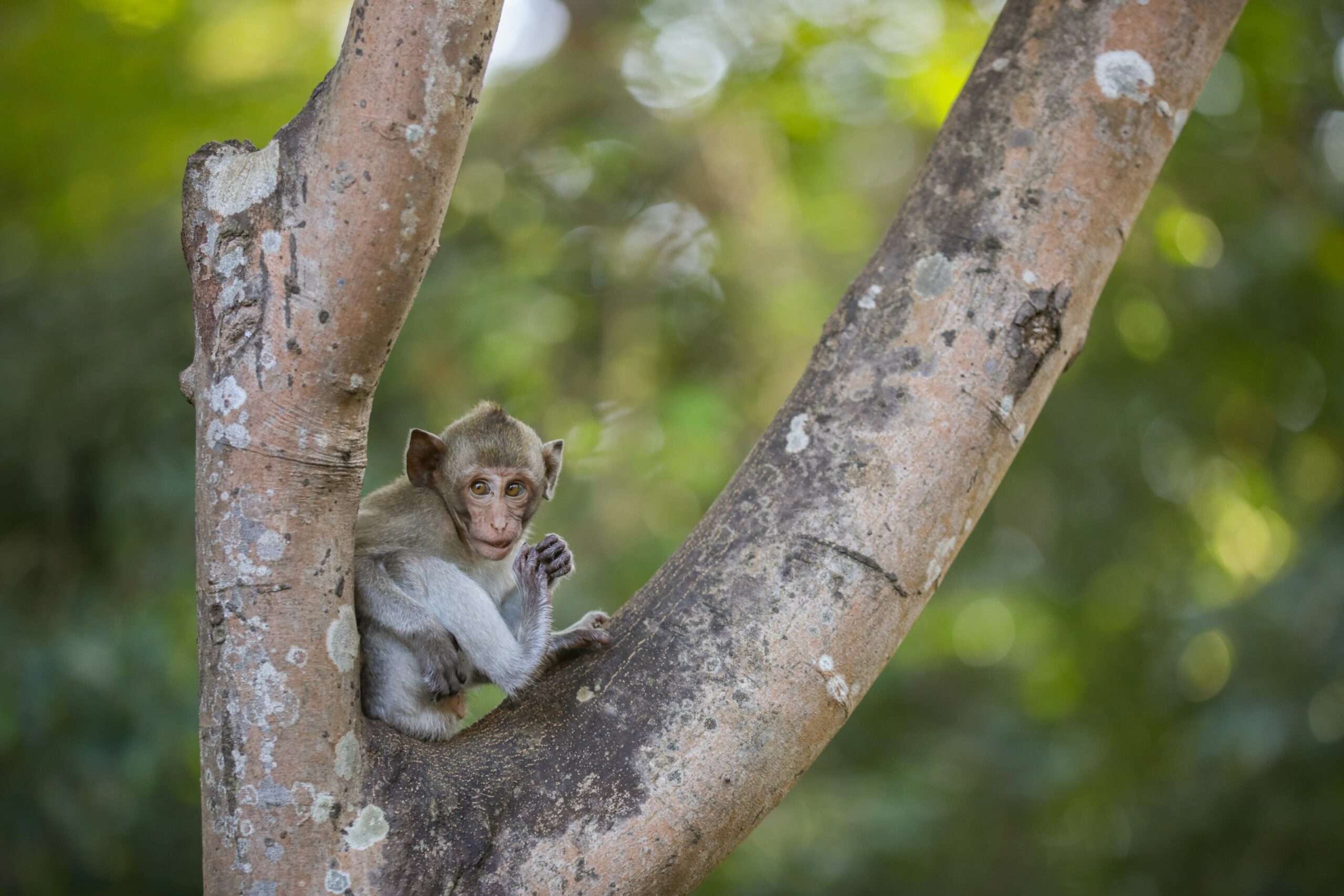
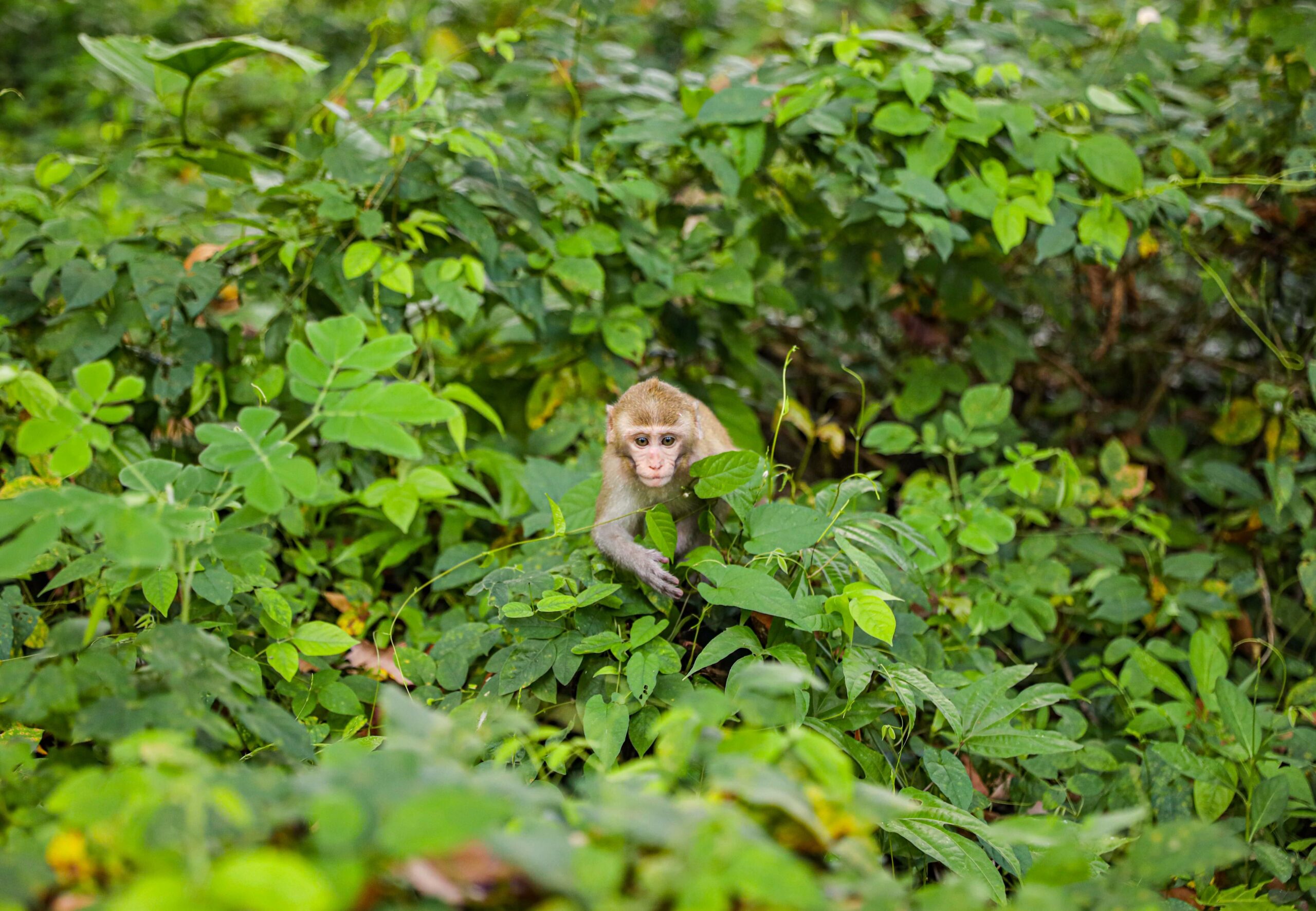
Long-tailed macaques are considered the most traded primate in the world because of their use in biomedical research. Last July, the species was uplisted from ‘vulnerable’ to ‘endangered’ on the Red List of Threatened Species, which cited “biological use” as a key threat. Photos by Anton L. Delgado for Southeast Asia Globe.
One of the only public documents with information about in-country breeding facilities is a leaked 2014 letter from the CITES Management Authority in Cambodia, which until recently was led by the indicted Omaliss.
The letter stated Cambodia’s six operational monkey farms had a total stock of nearly 56,000 macaques in 2014, a year when the Kingdom exported barely 5,000.
Based on these numbers, the researchers calculated the farms would have needed to breed almost double their stock to about 103,000 macaques to support the roughly 33,000 exported in 2020.
That’s likely a conservative estimate, they said, based on factors including infant mortality and fertility rates.
“To see such a rise in such a short period of time, it is almost astounding to the point where you almost have to ask: If it is real, they are doing something incredible. And if it’s not real, then they are doing something quite questionable,” said Regina Warne, lead author of the study.
Adding to the researchers’ doubt is how farms more than doubled exports after 2019, when just under 14,000 monkeys were traded. According to CITES data, Cambodia maintained this high level of export in 2021, trading 31,000 macaques.
“Taking the time, even though the mind boggles at doing these calculations, to arrive at a feasible number gives us that backing,” Warne said. “It is important to build that whole picture and drive home how significant this issue is.”
Not my monkey, not my circus: Trade continues as doubt deepens
It is unclear if any tangible policy or regulation changes have taken place within Cambodia’s farms.
“We will take stricter measures to make sure that all farms comply with the national laws, as well as CITES requirements,” wrote Thuok Nao, the new chairman of the CITES Management Authority in Cambodia, in an email to Southeast Asia Globe.
He wrote measures would include “inspection of facilities”, as well as making sure that monkeys are “born on the farms” and are not suspected of being wild-caught.
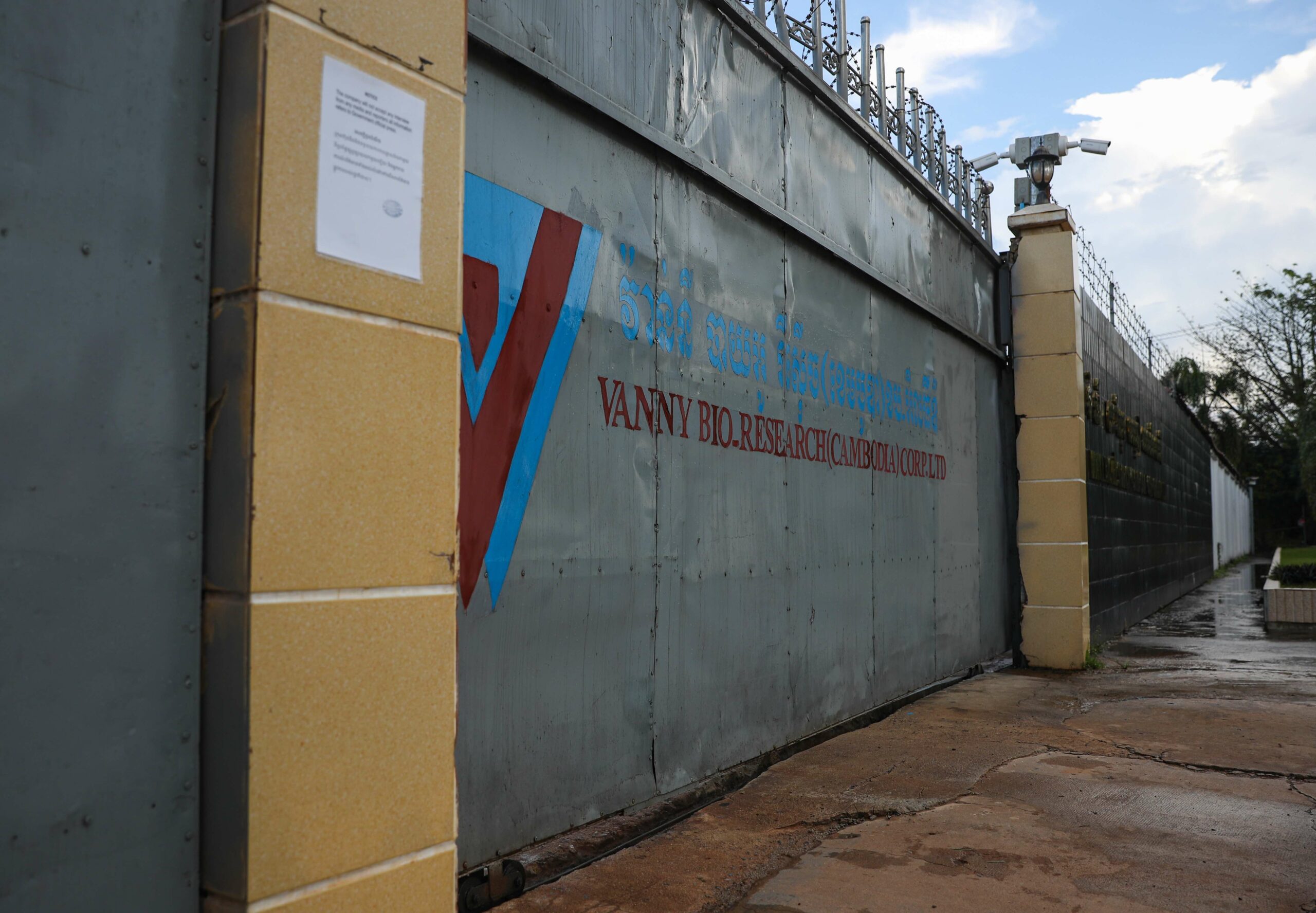
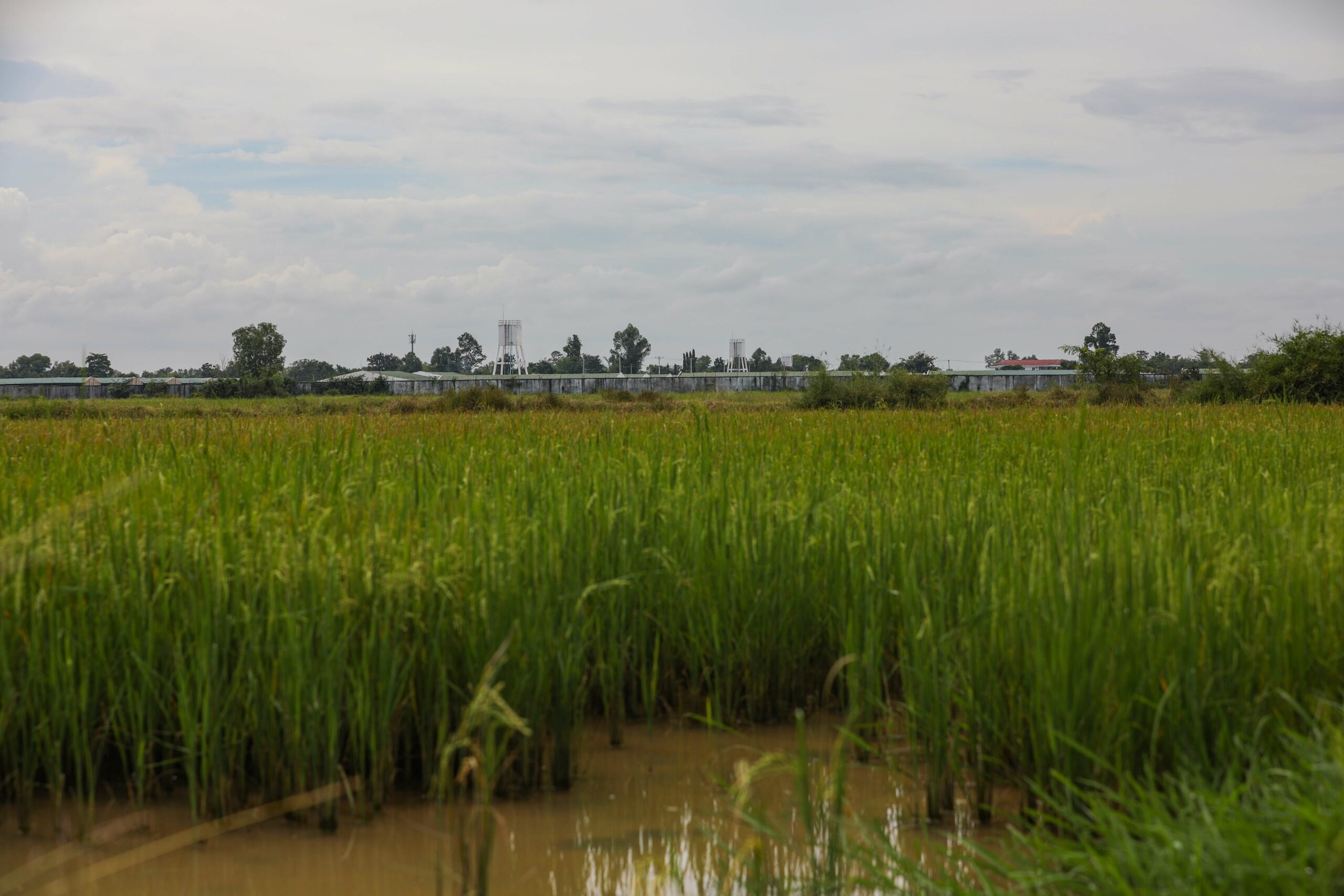
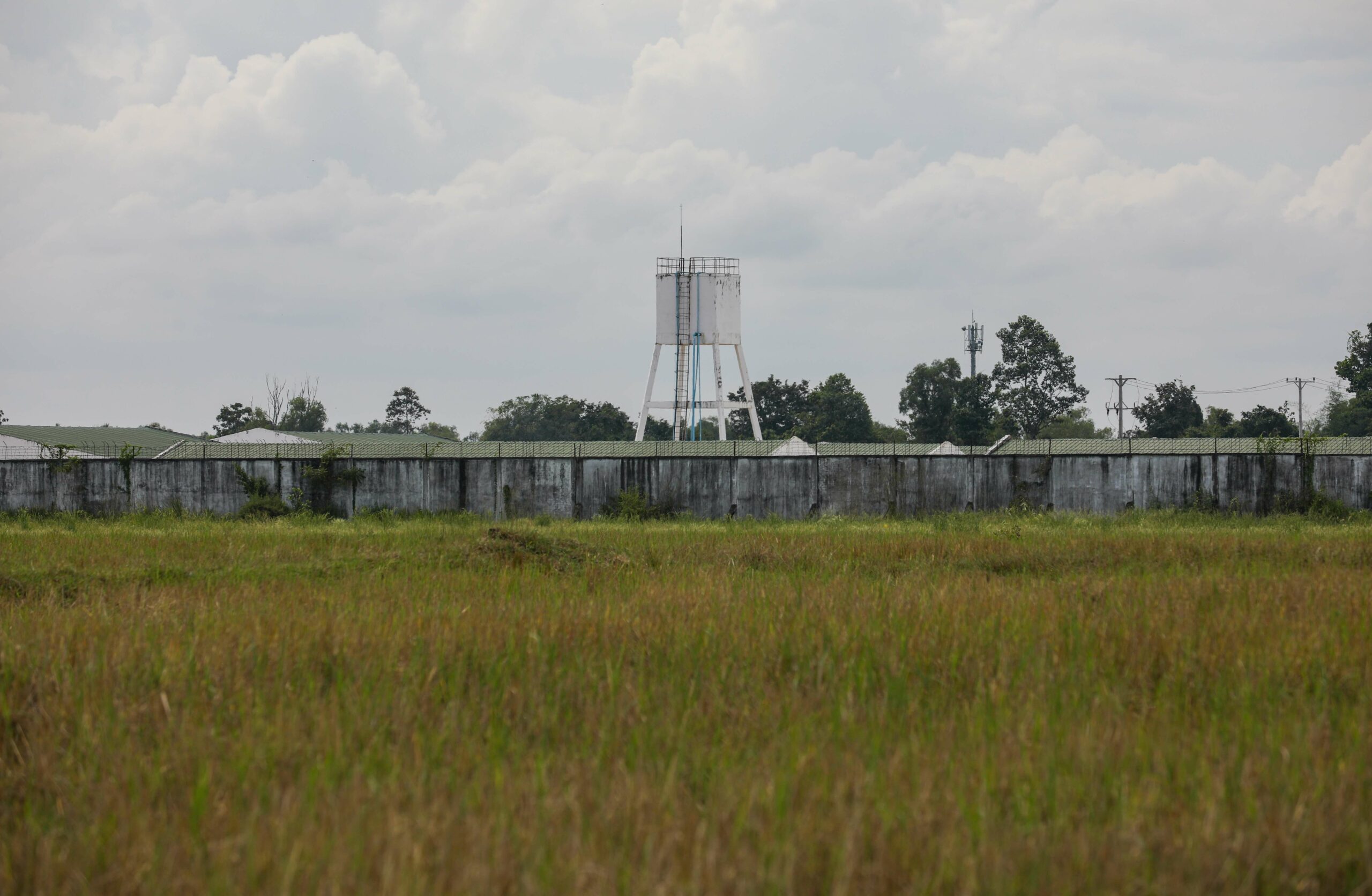
Vanny Bio Research has been the largest supplier of long-tailed macaques in Cambodia, which began dominating the global market for the species after the outbreak of Covid-19, for the last three years. In November, six employees were indicted for wildlife trafficking. Photos by Anton L. Delgado for Southeast Asia Globe.
These are all basic enforcement requirements mandated by CITES. If the Forestry Administration considers them to be new measures, it is unclear what it had been doing since Vanny Bio Research was certified to operate in 2004.
While controls may be unchanged, talk of the indictment or Cambodia’s monkey industry as a whole has become taboo among wildlife conservationists.
Representatives from the Wildlife Conservation Society, Wildlife Alliance, Fauna Fauna & Flora International, Conservation International and WWF-Greater Mekong all declined to comment on the subject, pointing to its political sensitivity. WWF-Cambodia said more than the others but not by much.
“Wildlife trafficking remains a serious major crime globally,” the office wrote to Globe. “Cambodia is a ratified party of CITES. So, illegal trade and trafficking of the species is against the law.”
Additional reporting by Sophanna Lay
This article was produced in collaboration with Kontinentalist, with the support of The Pulitzer Center’s Rainforest Investigations Network.

